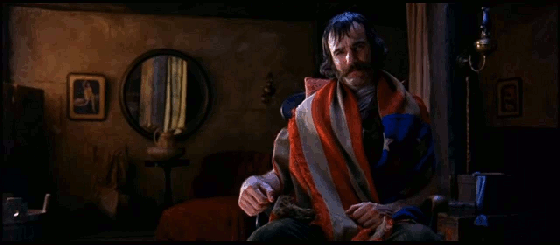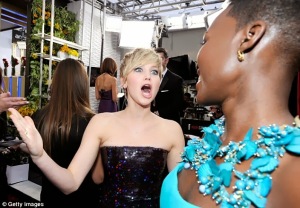“Lemme understand this. Maybe it’s me. I’m a little f*cked up, maybe. I’m funny how? I’m funny like a clown? I amuse you? I make you laugh? I’m here to f*ckin’ amuse you?”
Joe Pesci’s character Tommy DeVito in “Goodfellas” is my favorite character in any Martin Scorsese movie, even over Daniel Day-Lewis’s Bill the Butcher in “Gangs of New York.” His famous “funny like a clown” bit is the first time we really hear him talking, but not the first time we meet him—he appears in the film’s first scene, stabbing a pleading man 10 times with a kitchen knife. Later, he’ll shoot and kill a teenager (Spider) for basically nothing. In between shocking eruptions of psychotic brutality, he’s absolutely hilarious, an ultimate comedic sidekick.

Jack Nicholson was pretty classic as Frank Costello in “The Departed.” He also played a maniac having fun. Bill the Butcher was a maniac having fun.
Leonardo DiCaprio’s Jordan Belfort in “The Wolf of Wall Street” is another maniac having fun. And his fun is more fun that any of these other guys’ fun.
The setting is Wall Street, obviously, where Belfort runs his own incredibly successful brokerage firm. He is an animal of unconscionable greed, but that’s an abstract analogy; at the real, basic level he’s merely a dude who loves to get wasted. Drugs are “awesome,” he says at the beginning. At the end, cleaned-up and miserable, he says of sobriety “It sucks. I wanna f*ckin’ kill myself.” He does not talk or act like a mature adult. He’s a frat boy. He even argues with his dad about expenses.

Great movie poster
Matthew McConaughey is outstanding as an incredibly skinny cowboy with AIDS in “Dallas Buyers Club.” But I prefer Cocky Badass McConaughey, like in the short flashback scenes that launch “Wolf of Wall Street.” Belfort’s first day on a trading floor, curses are flying over phone calls all around him. (“I couldn’t believe how these guys talked to each other.”) McConaughey, a top dog there, makes a big sale and writes it on a piece of paper. He puts the paper into a tube, and hands the tube to Belfort to insert into an opening while the men around him cheer.
Then they have lunch. McConaughey is getting drunk and snorting cocaine as he lectures on the money game. This lunch is Genesis. “F*ck the client,” McConaughey says. He goes on a brilliant enlightened stoner’s rant, describing investing as “fairy dust.” “We don’t create sh*t and we don’t build anything.” He says “the name of the game” is to move dollars from your client’s pocket into your pocket. Keep the suckers investing, he says, so they’re getting rich “on paper” while the broker pays himself real cash in commissions.
Why? Inserting the tube. McConaughey tells Belfort he needs to jerk off twice a day. Do it often enough and you’ll get good at it, he says, and you’ll start to think about money while you do it.
He begins pounding his chest and growling a song, right there at the table. Belfort will eventually be leading an entire small horny army of trained traders. They will celebrate million-dollar days by pounding their chests and hooting and humping hookers, strippers and each other like crazed apes.
These people are truly crazy. In the first big party at the beginning of the film, they pay a woman $10,000 to let them shave her head. The clippers cut out her long hair as the traders cheer “Scalp! Scalp! Scalp! Scalp!”
“The Wolf of Wall Street” is about apish bad guys. Anyone who thinks this movie glamorizes or endorses its characters has somehow completely missed the point.
$r–$

The American Flag. It’s there for a reason. Bill the Butcher draped himself in an American flag for the scene in “Gangs of New York” when he quietly explained his method for maintaining power: “You know how I stayed alive this long? All these years? Fear. The spectacle of fearsome acts. Somebody steals from me, I cut off his hands. He offends me, I cut out his tongue. He rises against me, I cut off his head, stick it on a pike, raise it high up so all on the streets can see. That’s what preserves the order of things. Fear.”
There are American flags everywhere in the “Wolf of Wall Street” scene where Belfort confronts the FBI agents investigating him. They’re on Belfort’s yacht, fit for a “Bond villain.” (His words.) He tries to bribe the lead agent. When it doesn’t work—because the agent is Coach Taylor from “Friday Night Lights” and thus a man of character impeccable—he gets mad and kicks them out. “Good luck on the subway back to your ugly f*cking wives,” Belfort calls as he throws lobsters at them, “I’ll be having Nicole lick caviar off my balls.” Then he pulls a wad of cash from his pocket—”Look what I found! A year’s salary!”—and starts flipping hundreds at the agents as they walk off.

In real America the government is absolutely bought off by Wall Street. Check out the reporting of Matt Taibbi, an angry genius who might be the best reporter in journalism right now. (I have argued this point with actual reporters. It is an argument I always win. Taibbi is fearlessly covering corruption at the highest levels.)
Taibbi, in fact, wrote a piece for Rolling Stone about Mitt Romney during the 2012 presidential campaign, in which he compared Romney’s professional deal making at Bain Capital to a classic scene in “Goodfellas”:
Fans of mob movies will recognize what’s known as the “bust-out,” in which a gangster takes over a restaurant or sporting goods store and then monetizes his investment by running up giant debts on the company’s credit line. (Think Paulie buying all those cases of Cutty Sark in Goodfellas.) When the note comes due, the mobster simply torches the restaurant and collects the insurance money. Reduced to their most basic level, the leveraged buyouts engineered by Romney followed exactly the same business model. “It’s the bust-out,” one Wall Street trader says with a laugh. “That’s all it is.”
Here’s a picture of young Mitt Romney:

Did Romney ever bang his blonde wife on a heap of cash like Leo’s Belfort? I bet yes.
There’s a part where Belfort starts explaining what an IPO is into the camera, then he stops. You don’t care about this, he tells us. And it doesn’t matter anyway. His life is about the spoils. He’s destroying people’s lives to satisfy an insatiable need to be wasted at all times. He says the N-word, flies a helicopter hammered, and picks up gorgeous women while his wife watches. The first time he shows his underlings how to convince a potential investor to sign, he keeps lying to the targeted middle-class sap over speaker phone while he simulates raunchy sex moves in the air and flips off the phone. The silly minions cover their mouths to keep from cracking up.
This phone scene is what they should show for DiCaprio’s clip right before the Best Actor Oscar is announced. It is so mean, and so funny. The timing is flawless, where he’s finally putting his dick up inside an imaginary sex partner exactly as the sap agrees to invest. Belfort hates the guy on the other end of the phone, and he gets a raw, sexual rush from taking his money.
Belfort and his lackeys aren’t gangsters. Blood sprays once in this movie, and it makes Belfort’s partner (Jonah Hill, who’s perfect) puke. They aren’t killers; they’re douche bags. Because of what they did, though, and how they lived, they are definitely villains, and this makes them absolutely worthy of Scorsese’s cinematic magic. (Huge set pieces are full of moving parts—see the poster—and his camera goes everywhere.)
In Scorsese’s great modern classics, zany villains have been side characters. Tommy was funny like a clown, and “Goodfellas” wasn’t about him. “Gangs of New York” wasn’t about the Butcher, and “Departed” wasn’t about Costello.
Finally, the craziest bad guy is out front. He’s a wolf, and a clown.
Belfort drives even though he’s so wasted he can’t talk or walk. Cocaine-fueled cartoons like him have owned America’s economy. That’s legitimately funny, but it’s also terrifying. Like Tommy.










